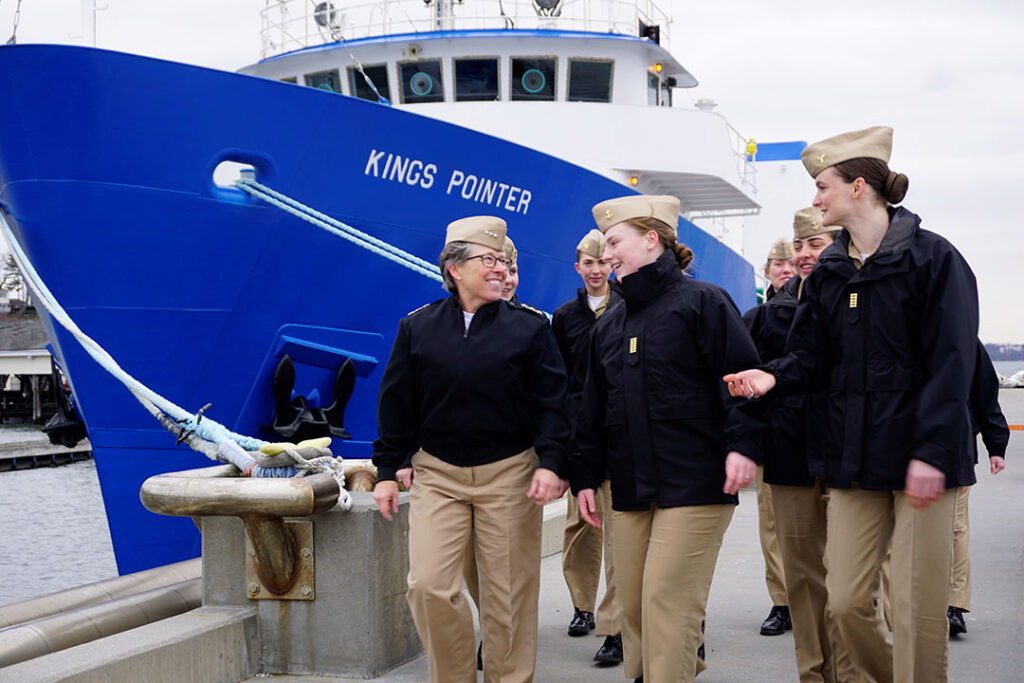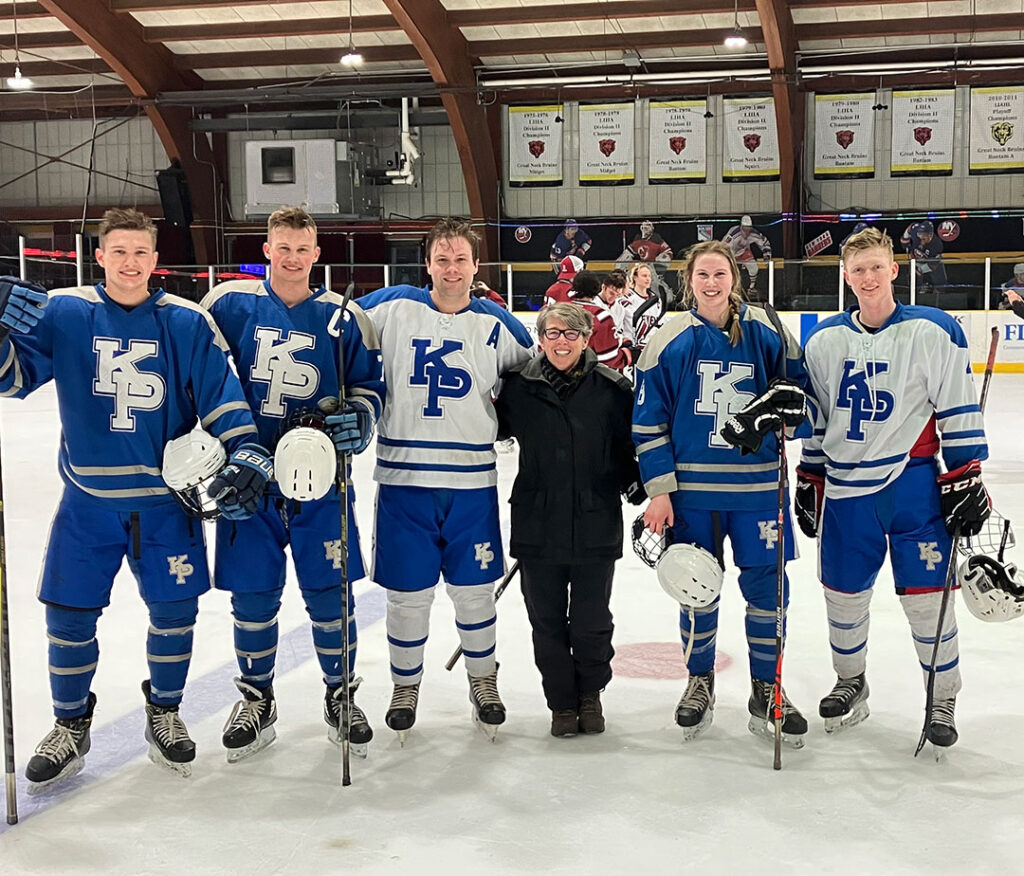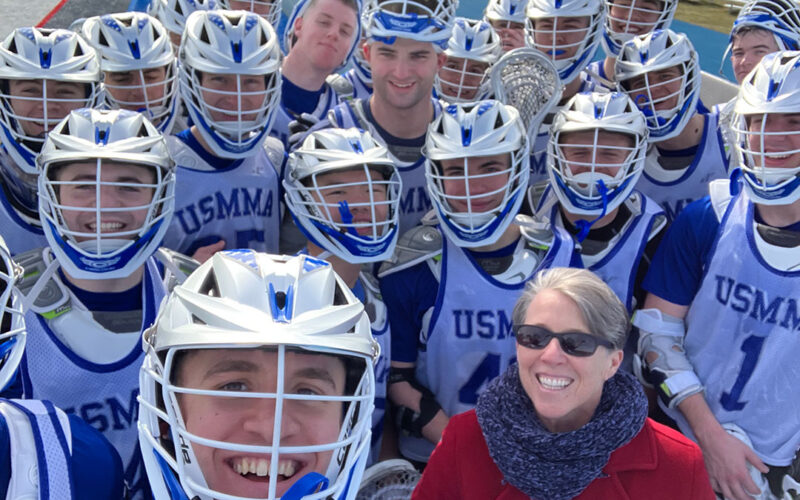
Rear Adm. Joanna Nunan retired from the U.S. Coast Guard in November 2022 after 35 years of service and was appointed Superintendent of the U.S. Merchant Marine Academy at King’s Point, NY, the following month – the USMMA’s 14th Superintendent and the first woman to hold the position.
A 1987 graduate of the U.S. Coast Guard Academy, Nunan’s early career included sea duty in the Caribbean, Gulf of Mexico, and Western Pacific before she was assigned as the last commanding officer of the USCGC Ironwood out of Kodiak, Alaska, and, subsequently, as the first commanding officer of the WWII-era cutter’s replacement, the 225-foot Spar.
During the course of her varied career, Nunan commanded a number of units at every level both afloat and ashore including assignments as Deputy Sector Commander in San Juan, Puerto Rico, as well as Commanding Officer of Coast Guard Sector Honolulu.
Nunan also served as the military advisor to Department of Homeland Security Secretary Jeh Johnson, military assistant to Department of Transportation Secretary Norman Mineta, and as Commanding Officer of the 9th Coast Guard District, which encompasses the Great Lakes and Saint Lawrence Seaways region.
Last year, prior to her retirement, she served as the Coast Guard’s Deputy for Personnel Readiness, overseeing recruitment, training and support of active-duty, reserve, and civilian personnel. She also supervised the U.S. Coast Guard Academy in New London, Ct., served on its Board of Trustees, and held the post of Assistant Commandant for Human Resources.
A native of Bridgeport, Ct., Nunan has earned an MBA from Rensselaer Polytechnic Institute and also holds three Coast Guard merchant mariner licenses – Master (1,600 Tons), Second Mate (2,000 Tons), and Unlimited Third Mate
Her interview with Professional Mariner was the first she held after assuming her new post at King’s Point.
Q: Admiral Nunan, how did you feel when you learned of your appointment to head the Merchant Marine Academy?
A: “I was absolutely thrilled. I retired last summer after 35 years on active duty with the Coast Guard and I was trying to figure out what to do next. I had some thoughts about what direction to take, and I knew what was important to me.
“One day early last spring someone mentioned to me that Admiral Buono was going to be retiring at the end of the school year; would I consider applying for that job? And as soon as I heard that, I realized that is what I want to do.
“It encompasses everything I care about…creating leaders; being part of the maritime world, both on the national and economic security side; the idea that you have a campus, a base per se, for that; and the fact that my husband Tom could be an active partner in the work, as there are very few jobs where your spouse gets to be in on the action with you.”
Q: Can you elaborate on that working relationship?
A: “We’ve been married for going on 32 years and Tom’s followed me to all the places that we’ve been stationed.
“He’s built up a lot of skill sets. Tom’s a sailor, a weightlifter, an actor, a judo guy, and a Phi Beta Kappa English major. He is very outgoing, and he’s volunteered already helping out the Weightlifting Club, and down at the waterfront.
“Both of our children are grown and out of the house, so it’s great to be here with nine hundred Midshipmen who are all gung-ho studying and doing sports and other activities to prepare for their incredible futures. We’re enjoying being part of that together.”
Q: How does your background mesh with your new assignment at the Academy?
A: “I feel that I’m the perfect person for the job. If you look at my Coast Guard career, not only have I gone to sea on five cutters, I also commanded two and along the way, just on my own account, earned my unlimited merchant mariner’s license, the same one that Midshipmen earn while they are here. I’ve also commanded ashore as captain of the port in Hawaii and deputy sector commander in Puerto Rico.
“When I commanded in the Great Lakes, I was district commander out of Cleveland working with partners in industry and the Canadian Coast Guard and other agencies in Canada.
“I’ve been working with mariners my entire career and had many opportunities to apply that experience in an inner-agency perspective when I served as military advisor to Secretary Mineta at DOT during the challenges of Hurricane Katrina. I was also able to help him as he worked out some of the issues we were facing in the nation’s ports.
“I also served as military advisor to the Secretary of Homeland Security and in that role I got to be a conduit between DHS and DOD. If you look at the rest of my career, I was in the people business working in human resources and human relations.
“One of my earliest tours was an admissions officer at the Coast Guard Academy doing, basically, the same things that I oversee here. I spent a couple of years working in the area of civil rights, which is something I’m very passionate about. When you get to the last three years of my career, that’s where I think I really honed some of my expertise that is very critical to the job here. Two years of that assignment were as Assistant Commandant for Human Resources overseeing everything on the people side from recruiting and retention to diversity, inclusion, sexual assault response prevention program, personnel policies, and all the policy changes we made during the COVID-19 pandemic.
“When I was the Deputy for Personnel Readiness, I oversaw the entire training enterprise and was chair of the Coast Guard Academy’s Board of Trustees.
“While there, I got to see many of the day-to-day things that happen at an academy, and so I really felt that when this job opened up, I could not have been more prepared. There is still plenty to learn and this is a new Academy for me. Though I’ve visited here over the years, I always felt like I was in the right place.”
Q: What about being the first woman superintendent?
A: “I think it’s great. You don’t want to be the last woman. I just saw that the Naval Academy is getting their first woman superintendent this summer, so by my count that leaves only West Point that hasn’t yet had a woman superintendent.
“I think as you look at some of the issues that Kings Point has faced, I think it can only help if you are out and about. I hope it gives parents some comfort knowing that I’m here and that I am very much wanting to ensure that this is a place that they feel safe sending their sons and daughters.”

Q: What are your priorities for the Academy?
A: “First are our facilities and it’s been well documented that they definitely need investment; they need shoring up and they need to be modernized.
“If you look at the president’s FY24 workforce budget, it almost doubles the budget from this current year. It has $92 million associated with improving facilities and investing in our campus improvement plan for maintenance issues and some underlying issues that we need to do.
“We just started a campus-wide maintenance contract. One of our biggest issues is just basic maintenance. Once we get those things in place and prove to be very good at maintaining what we have, our next step will be on how we modernize our facilities.
“Rebecca McPherson, a very seasoned senior executive service member, has been hired to serve as director of both facilities and infrastructure. Previously, we had new building operations and maintenance under two different people. We’ve also already completed some upgrades to our IT network and that’s something we need to continue.
“We also need to do way better at diversity at our school and that’s across-the-board. It’s not just the Midshipmen; it’s faculty and staff. Along with that is the idea of having a culture and a climate that are inclusive and makes someone feel that they belong.
“We built up a much bigger team than we used to have to prevent sexual harassment and we’re looking at revamping our entire program with staff to include a lawyer that is an expert in victim advocacy and accountability. We’ve partnered with local police and the district attorney’s office so if do we have a criminal case, not just sexual assaults, we can have trained professionals investigate.
“There’s a lot we’re doing to make sure that people feel comfortable reporting harassment and assault incidents, whether they’re here on campus or at sea. Last year, we took a six-week pause in our Sea Year so legislation could be enacted that made us feel comfortable sending our folks back to sea.
“The fourth priority is overhauling our academic and leadership programs. I’m focusing on making sure that we are providing the best possible development for our future leaders and our future mariners.
“That has several different aspects to it in terms of our curriculum. Are we giving our faculty and staff the proper things for development to improve their skills, for example?
“It’s a very challenging program that our Midshipmen go through. They’re very much the best of the best, but we need to provide them a lot of support because this is one place where if you start falling behind it’s very hard to catch up. So, we have a lot of support including peer tutoring put in place.”
Q: Do you envision any further changes in the Academy’s Sea Year?
A: “I feel very good about what’s been put in place. In addition to that, we send all our cadets to sea with a satellite phone, a Garmin text device, and their ‘sea partner’ so there’s another person with them.
“The message is getting out that our people won’t be part of a negative culture, and companies are realizing that it is in their best interest to provide a welcoming and respectful environment.”
Q: With maritime security issues flaring up around the world, how is the Academy preparing the next generation to operate in ‘contested’ environments?
A: “That is what we do. Going back to our origins, the Merchant Marine Academy stood up during World War II. They needed to create more merchant mariners, and we didn’t wait until they graduated. Our Midshipmen know that they are going out to sea and they are ready to serve now.”
Q: What’s the percentage now of graduates going to sea?
A: “Last year and this year will probably be similar with about 35 percent going on active duty in any of the armed services. About 65 or 70 percent will be going to sea.”
Q: Are you satisfied with that percentage?
A: “I am because I know there are times when there are plenty of jobs at sea and, at other times when there’s not. People coming here do have plenty of options. I really do feel like going to sea is our primary career track and I think we’re doing just about everything we can do we promote that as our premier program.”
Q: Are you teaching celestial navigation and paper charting?
A: “Yes. Chart plotting is one of the tests they take to get their licenses. They know how to shoot angles and the deck folks are learning Morse Code.
“In some ways, our teaching is very old-school, but we also have modern, technologically advanced training, as well. We have state-of-the-art simulators, and they’re on all sorts of ships during their ‘Sea Year,’ so they’re exposed to both old school and modern technology, as well.”
Q: What do you think the Academy will look like in five or 10 years?
A: “It will look very similar, but we’ll see that the facilities and our waterfront will be in much better shape. We’ll not have stormwater management issues and, in general, we’ll have better IT and more reliable utilities. Hopefully, at the 10-year mark, we’ll see some new construction underway.”
“Some of the things that people love about Kings Point, though, will not change. The campus is beautiful and historic, and there’s only so much space to utilize.”
Q: When your tenure at the Academy ends, what would you like to see as your legacy?
A: “I absolutely want to leave Kings Point better than I found it. The facilities are in better shape. The quality of our program is even better.
“I’d like to see a larger student body, and I’d like to see the student body have twice as many women as we do now, and three times as many underrepresented minorities as we do now. I would like it to be a place where each and every person there feels that they belong.” •

